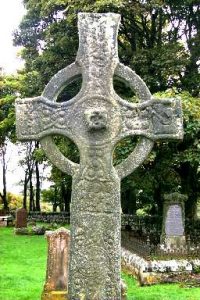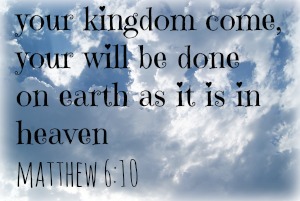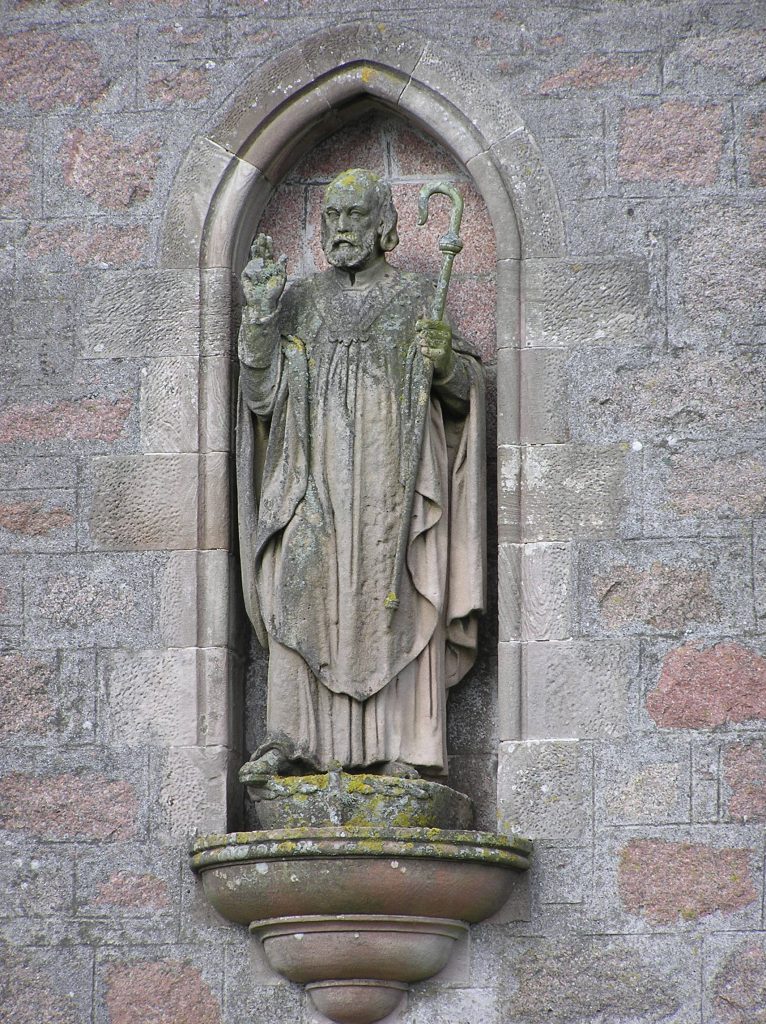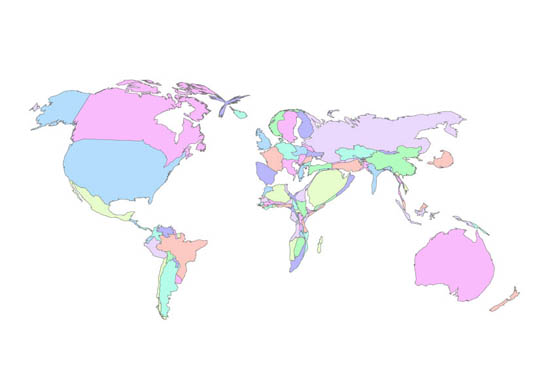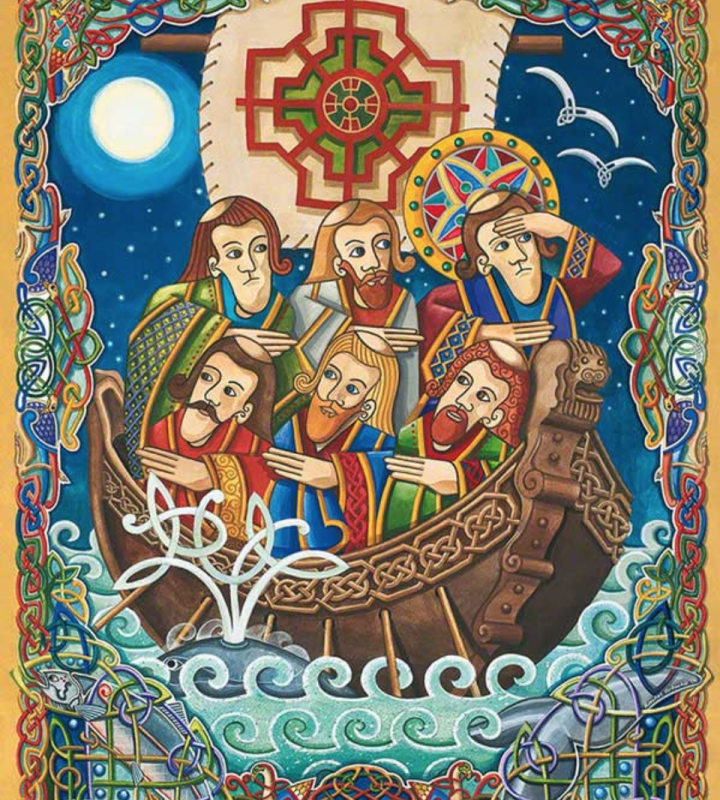Today’s Lenten prayer is a Celtic going forth prayer. It is meant to be for going forth out into the day but I love to use it at the end of a seminar as a going forth from one place to the next. It is another great Celtic prayer to meditate on in this season of Lent.
I originally came across this prayer in a little book entitled Celtic Fire, a delightful collection of stories and prayers that I would heartily recommend to you.
Let us go forth
In the goodness of our merciful father
In the gentleness of our brother Jesus,
In the radiance of his Holy Spirit
In the faith of the apostles,
In the joy praise of the angels,
In the holiness of the saints,
In the courage of the martyrs.
Let us go forth
In the wisdom of our all-seeing Father
In the patience of our all-loving brother,
In the truth of the all-knowing Spirit,
In the learning of the apostles,
In the gracious guidance of the angels,
In the patience of the saints,
In the self control of the martyrs,
Such is the path for all servants of Christ,
The path from death to eternal life.
Today’s reflection is adapted from this post which Kathy Escobar posted during the original Journey Into Wholeness challenge in 2009.
“man does not live by bread alone.” luke 4:4
another week has flown by. it seems for some reason that the past few weeks have flashed by; if i slow them down a bit and think about all of the ins and outs of people and relationships and crises and traumas and dramas, i just have to laugh and chalk it up to an average couple of weeks in the life together in the refuge community. but today, i’m longing for mexico. as i mentioned last week, i am a week behind on this journey into wholeness. this week for me was the journey into hunger. in the material was a powerful challenge to feed your family for a week on$2 per person per day. i was one of those people who from the beginning said “i just can’t do this right now.” i don’t regret my decision, because it was a realistic one given our current situation. what i did do, though, is really intentionally put all kinds of facets on “hunger” in the forefront of my mind. it was an interesting week.
i was sharing last night at our house of refuge that that in the midst of thinking a lot about hunger and the $2 challenge and all kinds of other things related to food and the lack thereof for so many people, i of course had one day where the only things i ate all day were: 2 poptarts, about 30 conversational hearts left over from valentine’s day, and a row of thin mint girl scout cookies. ugh! how pathetic. but how telling. i was painfully aware this whole past week of how much we have. how much we waste.
another interesting conversation this week was with my 9 year old twins. i was done reading a story to them and asked them “what do you do when you’re hungry?” of course, they chimed together “eat!”
then i asked them “what do people in other poor countries do when they’re hungry?”“ guess what they said? “eat!” of course i immediately felt like a terrible parent who clearly has not done what i was supposed to teach my children properly about these kinds of things! but the truth is that regardless of how much we talk “kids starving in africa” they have no concept that there are people who really truly do not have food to eat, period. of course they’ve heard us tell stories, have seen the american idol-in-africa stuff, and have helped us bring food to people who needed it. but the truth is that they can’t get their little sweet heads around the reality that people truly would be hungry and not somehow get something to eat.
then i started thinking about some of my friends who don’t have resources, who live on the margins economically in every way possible. they aren’t going to starve to death like they would if they lived in africa, but in reality when they are hungry, and don’t have enough money to buy food, here’s what they do to get it: pawn something, sell some prescription drugs to a few friends, trade a ride to the store for some groceries, don’t eat so the kids can. and as i think about their reality then i start getting sad that there really is enough food even in our little poor community but it is so hard with us all spread out all over the place to share properly; i wish someone who was wildly passionate about intentionally sharing would swoop into our community & make it all magically happen for us. and then i remember that is not how it usually works
so i switch gears and then begin to think about people living in poverty around the world and what they do when they are hungry. they sell their bodies. they sell their children into slavery. they wait in lines for days for bags of rice that might get stolen from them on the way home. they watch their children starve. it is unthinkable that they are dying not from lack of resource, because the provision is indeed available, but from lack of proper distribution.
a couple of nights ago we talked about some of this at our house of refuge. everyone there is not going to die from lack of food, at least at this point, i am almost 100% certain. but among all of us–to varying degrees–is a spiritual hunger, a desire for God. an emptiness, a thirst. when i asked the question “so what are we supposed to do when we are spiritually hungry?” the first response was “eat chocolate ice cream!” (but he had already skipped to the next question unintentionally). the answers were “go to God… read the Bible…connect with others…be still…spend time with God…pray…seek God…”
but then i asked the question, “what do we actually do when we are spiritually hungry? what do we go to? “ here are our collective responses, at least the ones that we wrote down:
- food
- chocolate ice cream
- a consuming focus on another person
- do anything to not be alone
- play spider solitaire for hours
- watch scary movies
- sleep
- get busy
- exercise (i wish i had that one!)
- talk, chatter on cell phone
- mindless TV watching/reading
- isolate, disconnect
- drink
- control more
what would you add to the list?
mine is definitely work harder, stay busy, talk talk & more talk, get lost in the chaos, and start over the next day. the truth is that all of these things do help fill something at least temporarily. it’s not that they are all bad or all wrong or somehow don’t serve any good purpose. the problem, though, is that ultimately they will not satisfy. they are substitutes & will keep us distracted from the real thing. they leave us hungry.
isaiah is my favorite old testament book; so much beauty in there. chapter 55 came to mind yesterday:
“Give ear and come to me; hear me, that your soul may live. “Come, all you who are thirsty, come to the waters;and you who have no money, come, buy and eat! Come, buy wine and milk without money and without cost. Why spend money on what is not bread, and your labor on what does not satisfy?Listen, listen to me, and eat what is good,and your soul will delight in the richest of fare.Give ear and come to me; hear me, that your soul may live. “(1-3a)
why spend money on what is not bread, and your labor on what does not satisfy. i think for me i have a weird natural tendency to avoid things that are really good for me.–including God. i don’t like saying that out loud, but it sometimes feels true. in subtle or sometimes direct ways i avoid seeking God, pursuing God, letting him satisfy me with good things, bring his wine and bread and milk and honey. honestly, i don’t want to make myself that vulnerable.
the biggest takeaway for me from wednesday’s conversation is the gap between what people can provide and the work of the Holy Spirit. i have no doubt that God uses people. real-life-in-the-flesh people to be God’s hands, feet, heart in all kinds of wacky and miraculous ways. through people i am constantly encountering Jesus. but at the same time, a gap exists that people can’t fill. that is the quiet and mysterious and sometimes illusive work of the Spirit that can creep into the deepest cracks and satisfy like none other.
so that’s what i’m hungry for this lenten season.
* * * * *
ps: we had a reflective time to write a psalm of hunger using this template i wrote as a guide.
we called it psalm 311 for march 11th. here’s mine. if you give it a try, let me know. i’d love to read it.
——
kathy co-pastors the refuge, an eclectic beautiful faith community in north denver, juggles 5 kids & an awesome husband who has a bunch of jobs, too.
She’s an advocate for friends in hard places, a trained spiritual director (one who’s a little on the loud side) & loves to teach and facilitate events, workshops, and groups. she writes a little, hangs out with people a lot, and teaches college classes online because missional living doesn’t pay the bills.
these all blend together and make for one messy life in the trenches with people.
kathy is most passionate about community, the marginalized, healing, spiritual transformation, equality, justice, “church”, relationships, diversity, and learning to love and be loved. She bogs at http://kathyescobar.com/
One of the highlights of our life has been the opportunity to spend Holy week on the island of Iona several years ago. During that pilgrimage I was given a copy of what is known as Columba’s prayer. It is still one of my favourites for quieting my soul and helping me to become attentive to the voice of God.
Columba founded the Abbey on Iona and is attributed with spreading Christianity throughout modern day Scotland. His life was not without controversy however as he was exiled from Ireland following a dispute over the copying of a psalter. The dispute resulted in the Battle of Cúl Dreimhne in 561, during which many men were killed. A synod of clerics and scholars threatened to excommunicate him for these deaths, but St. Brendan of Birr spoke on his behalf with the result that he was allowed to go into exile instead. On the advice of an aged hermit, Molaise, he resolved to expiate his offense by going into exile and win for Christ as many souls as had perished in the terrible battle of Cuil Dremne. I wonder if as he wrote this and meditated on his own words, he remembered the battle and his failure to listen to God at the time of this dispute.
Sometimes in a lowly cell, in the presence of my God,
I stand and listen.
In the silence of my heart I can hear his will,
When I listen despairing people flock to me,
They expect that I can see the answers,
They ask my advice, they say I am wise.
I answer that nothing can deceive me,
If I stand alone and silently listen.
For I am but a servant who is guided by his king, when I listen.
Sometimes in a lowly cell in the presence of my God
I stand and listen.
In 2006 the UN World Food Program produced but never publicly released this map charting food consumption. Depending on your perspective it maps obesity or starvation.
In an article in Huffington post Princess Haya Al Hussein commented:
The mis-distribution of food goes deeper than even the “Fat Map” implies. In India, for example, more than 300 million overweight people coexist with another 300 million who starve. Chronic diseases like diabetes and heart disease that often stem from overeating are growing at a far faster rate in developing countries than in the more prosperous West. In my own region, the Middle East, obesity is skyrocketing, especially among young people.
In 2007-2008, a global food crisis surprised us as prices soared. But would the crisis have been as severe if we were not so accustomed to wasting the food we have?
The data was updated in 2012, and American Samoa and Saudi Arabia pushed the U.S. out of the top position. Reuters estimated that obesity in America added an astounding $190 billion to the annual national healthcare price tag, exceeding smoking as public health enemy number one when it comes to cost. According to Sheldon Jacobson of the University of Illinois, the extra weight carried by vehicles as a result of obese and overweight Americans is responsible for almost one billion additional gallons of gasoline being burned each year by our automobiles—nearly 1 percent of our total gasoline usage.
In some places overeating has become a popular spectator sport with You Tube videos of overeating competitions receiving hundreds of thousands of hits.
I realize that this is not a simple eat less be healthy equation. Some people who are fat are very healthy and some who are skinny suffer from eating disorders that are as detrimental to their health as overeating is. However the inequity of food distribution and the resulting starvation, even in developing nations is something that should outrage us, and the complacency with which we watch starving children in Africa while consuming enormous meals that give us heart disease and diabetes should have us on our knees in repentance.
There is another dimension to this too. Currently, in the U.S., almost half of our food — 40 percent of what we grow— ends up in the garbage. Globally, food waste is rising to 50 percent as developing nations struggle with spoilage and Western nations simply toss edible food away. Instead of turning our food system inside out to meet that 2050 deadline, why don’t we simply waste less?
Of course cutting down on my wastage here in the U.S. will not help starving children in Africa, but as Jesse Hirsch and Reyhan Harmanci point out in Food Waste: The Next Revolution it might help keep food prices down so that their parents can afford to buy food.
Hirsch and Reyhan also point out that the environmental toll for throwing away so much uneaten food is also costly. Of the millions of tons that we waste in America each year, the U.S. Environmental Protection Agency (EPA) estimates 96 percent ends up in landfills. Food waste is the number one material taking up landfill space, more than paper or plastic. This produces methane gas, one of the most harmful atmospheric pollutants.
So as you think about the challenges of hunger this week, think too about how much food waste you create each week. How much of it goes into the landfill?
Now ponder Princess Hussein’s question about the food crisis we still face: Would the crisis we have be as severe if we were not so accustomed to wasting the food we have? You might like to read through this list Don’t Waste Food: Eat Your Trash and Improve your Cooking of possible ways to cut back on your food waste. Perhaps we can all save enough money to help those who really need that food.
The Prayer of St. Brendan
Listen also to this rendition of St. Brendan’s Voyage
Here are the lyrics:
St. Brendan’s Voyage
Christy Moore
A boat sailed out of Brandon in the year of 501
’twas a damp and dirty mornin’ Brendan’s voyage it began.
Tired of thinnin’ turnips and cuttin’ curley kale
When he got back from the creamery he hoisted up the sail.
He ploughed a lonely furrow to the north, south, east and west
Of all the navigators, St. Brendan was the best.
When he ran out of candles he was forced to make a stop,
He tied up in Long Island and put America on the map.
Did you know that Honolulu was found by a Kerryman,
Who went on to find Australia then China and Japan.
When he was touchin’ 70, he began to miss the crack,
Turnin’ to his albatross he sez “I’m headin’ back”.
To make it fast he bent the mast and built up mighty steam.
Around Terra del Fuego and up the warm Gulf Stream,
He crossed the last horizon, Mt. Brandon came in sight
And when he cleared the customs into Dingle for the night.
When he got the Cordon Bleu he went to douse the drought,
He headed west to Kruger’s* to murder pints of stout
Around by Ballyferriter and up the Conor Pass
He freewheeled into Brandon, the saint was home at last.
The entire population came (281) the place was chock-a-block
Love nor money wouldn’t get your nose inside the shop.
The fishermen hauled up their nets, the farmers left their hay,
Kerry people know that saints don’t turn up every day.
Everythin’ was goin’ great ’til Brendan did announce
His reason for returnin’ was to try and set up house.
The girls were flabbergasted at St. Bredan’s neck
To seek a wife so late in life and him a total wreck.
Worn down by rejection that pierced his humble pride,
“Begod”, sez Brendan “If I run I’ll surely catch the tide”
Turnin’ on his sandals he made straight for the docks
And haulin’ up his anchor he cast off from the rocks.
As he sailed past Inishvickallaun there stood the albatross
“I knew you’d never stick it out, ’tis great to see you boss”
“I’m bailin’ out” sez Brendan, “I badly need a break
A fortnight is about as much as any aul saint could take.”
CHORUS
“Is it right or left for Gibraltar”
“What tack do I take for Mizen Head?”
“I’d love to settle down near Ventry Harbour”,
St. Brendan to his albatross he said.
And a beautiful animated version of Brendan’s voyage as related by children
Feature Photo: Brendan’s voyage via http://www.puzzlewarehouse.com/St-Brendan-the-Navigator-pur357.html
I never was able to do the splits. It hurts and doesn’t seem like it should be humanly possible. In many ways in life, I feel like I’m often trying to do the splits between the different worlds that I straddle–being ‘bridge-builders’ we call it at Tierra Nueva. Whether its Skagit and Seattle, charismatic and social justice, jail and the church ‘on the outs’, communities of new Mexican immigrants and primarily Anglo communities, and now India and the USA.
I now am home, or back in the US. Since I was born, I’ve actually felt at home in many places not represented by my passport. The differences, as always are stark…
I stand staring at Trader Joe’s cheese section–once again shocked by the choices
I walk the streets at dusk–amazed that I can go blocks without seeing a person or a moving car.
I throw my laundry into two different machines and its done in a couple of hours.
I drink from the tap, wash veggies from the tap, and brush my teeth from the tap.
I shower, whenever I want, with hot water–always.
And these are just the minor differences.
I don’t think I’ll ever get used to doing the splits. Sure the stark differences always fade with time, but I think it will always hurt a bit. Or at least can feel like I’m pulling at two different bungee cords, trying to connect them, and they’re not quite long enough so just keep snapping back to place.
I wrote the below poem while I was in India, living in a very different neighborhood, my heart breaking with the reality of thousands (millions?) of families living outdoors and thousands who sell their bodies day an d night. Maybe by sharing these glimpses, I’m inviting you to hold these worlds in tension and help me bring them together.
d night. Maybe by sharing these glimpses, I’m inviting you to hold these worlds in tension and help me bring them together.
India, will things change?
Will the homeless families who live on the streets ever move indoors?
There’s a couple who live outside just kitty corner to me,
Bedmat raised on bricks, Kali icon on the wall,
More bricks making a stove for breakfast, lunch, and dinner
Their home between two parked cars.
It’s getting cold. Even here.
Another family round the corner.
Thin blankets and cement sidewalks.
Body heat to warm the three small ones,
Huddled between ma and baba.
Her eyes look up at me as I walk by,
One afternoon after nap time.
Yes, I see you young one.
But I have no answers for you.
Only my cry to God: Have mercy, Come Jesus Come!
That is my refrain in this land,
As I walk by haunted eyes and haunting Kali temples,
Broken men curled up on sidewalks and dogs limping with broken bones,
Hungry faces…are they also hungry for change?
Or have they lost all hope?
India, will things change?
Across the street, 24-7,
Women of all ages ‘work the line’.
10,000 in this city,
Waiting for customers
Night after night.
“Live for today,
Today is all we have.”
I too want to live in the present,
But not without hope for restoration.
Come Jesus Come!
That is my refrain in this land,
As I try to ‘see from God to the problem, not from the problem to God’.
I’m hungry for change–for healing, restoring, reconciling Kingdom change.
So, Loving God, you who crossed the boundaries,
Come break again these dividing walls.
Originally posted at http://tierranuevabetania.blogspot.com/2014/02/its-been-whirlwind-of-return-for-me.html
Bio
Bethany Dearborn co-directs Tierra Nueva’s Family Support Center, coming alongside farmworker families as they navigate life in the US. She is also a member of the leadership council, a women’s jail chaplain, and is involved in local human trafficking and immigrant rights coalitions. She is passionate about participating in God’s Kingdom through engaging in holistic advocacy and discipleship of those who are marginalized by society; as well as mobilizing grassroots community efforts that address unjust systems.
She blogs at http://tierranuevabetania.blogspot.com.
I love this prayer attributed to St Brigit of Kildaire. Evidently she always had a great love for the poor which is very evident in this prayer
BRIGIT’S FEAST
I should like a great lake of finest ale,
for the King of Kings
I should like a table
of the choicest food,
for the family of heaven.
Let the ale be made
from the fruits of faith,
and the food be forgiving love.
I should welcome the poor to my feast,
for they are God’s children.
I should welcome the sick to my feast,
for they are God’s joy.
Let the poor sit with Jesus
at the highest place,
and the sick dance with the angels
God bless the poor, God bless the sick,
and bless our human race.
God bless our food, God bless our drink,
all homes, O God, embrace.

As an Amazon Associate, I receive a small amount for purchases made through appropriate links.
Thank you for supporting Godspace in this way.
When referencing or quoting Godspace Light, please be sure to include the Author (Christine Sine unless otherwise noted), the Title of the article or resource, the Source link where appropriate, and ©Godspacelight.com. Thank you!

